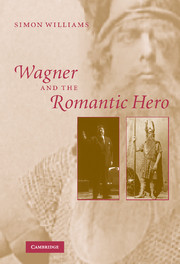Book contents
- Frontmatter
- Contents
- Acknowledgments
- Note on abbreviations of sources
- Introduction
- 1 Modes of heroism in the early nineteenth century
- 2 Wagner and the early nineteenth-century theatre
- 3 Early music-drama: the isolated hero
- 4 Heroism, tragedy, and the Ring
- 5 The last music-dramas: toward the messiah
- 6 Wagner's heroism on stage
- Notes
- Bibliography
- Index
5 - The last music-dramas: toward the messiah
Published online by Cambridge University Press: 22 September 2009
- Frontmatter
- Contents
- Acknowledgments
- Note on abbreviations of sources
- Introduction
- 1 Modes of heroism in the early nineteenth century
- 2 Wagner and the early nineteenth-century theatre
- 3 Early music-drama: the isolated hero
- 4 Heroism, tragedy, and the Ring
- 5 The last music-dramas: toward the messiah
- 6 Wagner's heroism on stage
- Notes
- Bibliography
- Index
Summary
LAST DRAMAS
If old age is marked by a desire for death as a relief from the rigors of life, then Wagner started aging when he was still quite young, at forty-one, after his first reading of Schopenhauer. Through Schopenhauer he learnt that survival in an antagonistic world comes most effectively through resigned acceptance, which led him to a sensation of profound peace which seemed to cancel his self. As he wrote to Liszt:
His principal idea, the final denial of the will to live, is of terrible seriousness, but it is uniquely redeeming … When I think back on the storms that have buffeted my heart and on its convulsive efforts to cling to some hope in life … I have now found a sedative which has finally helped me to sleep at night; it is the sincere and heartfelt yearning for death: total unconsciousness, complete annihilation, the end of all dreams – the only ultimate redemption.
Wagner still had twenty-nine years to live and while his letters and personal writings indicate a continuing yearning for death, he spent most of his time living very much in the world, as the contentious, intensely ambitious, cantankerous, visionary individual he had always been. The sensibility of his music-dramas did, however, begin to shift. The first sign of this came when he broke off composition on the Ring in 1857.
- Type
- Chapter
- Information
- Wagner and the Romantic Hero , pp. 102 - 141Publisher: Cambridge University PressPrint publication year: 2004



